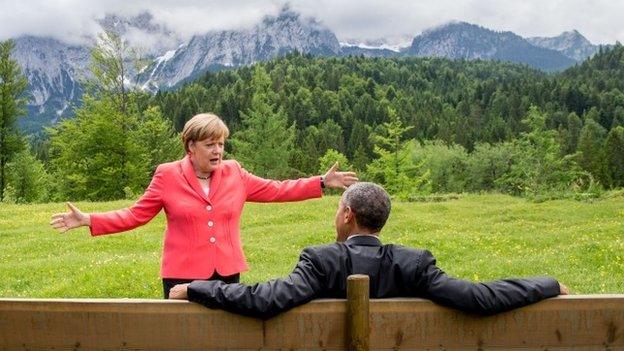Russia's Putin tests EU unity with visit to Italy's Renzi
- Published
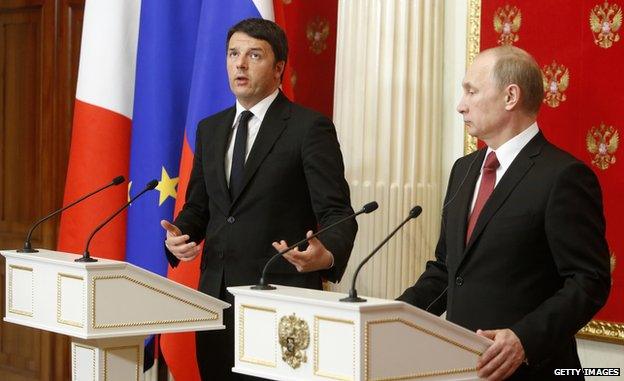
The Italian prime minister travelled to Moscow to see the Russian president in March
As Vladimir Putin makes a rare trip to Western Europe, meeting Prime Minister Matteo Renzi in Milan on Wednesday, what does he hope to achieve?
A little help, perhaps, from an old friend?
In a wide-ranging interview with Italian newspaper Corriere della Sera, external at the weekend, the Russian president spoke at length about his country's "special relationship" with Italy and used the opportunity to detail what he sees as Moscow's unfair treatment by the international community.
"There's no need to threaten us with sanctions," he said, adding there was "no need to fear Russia."
Some wondered whether the interview and the visit, coming at a time when European leaders are discussing whether to continue punishing Russia for its alleged involvement in Ukraine's conflict, might represent an attempt to weaken EU resolve.
EU trade and investment sanctions expire at the end of July. A decision on whether or not to renew them will be taken at a leaders' summit at the end of this month.
And under EU rules, the decision has to be unanimous among all 28 members.
Minsk ceasefire
Mr Putin only needs one dissenter to avoid an automatic rollover.
With this in mind, some of the references in Mr Putin's interview to the range and depth of Russia's economic relationship with Italy (including an elevenfold increase in trade in recent years and almost a million Russian tourists visiting Italy last year) seemed somewhat pointed.
"We are, of course, ready to reciprocate and go further in expanding our co-operation as long as our Italian partners are willing to do the same," he said. "I hope that my upcoming visit to Milan will help in this respect."
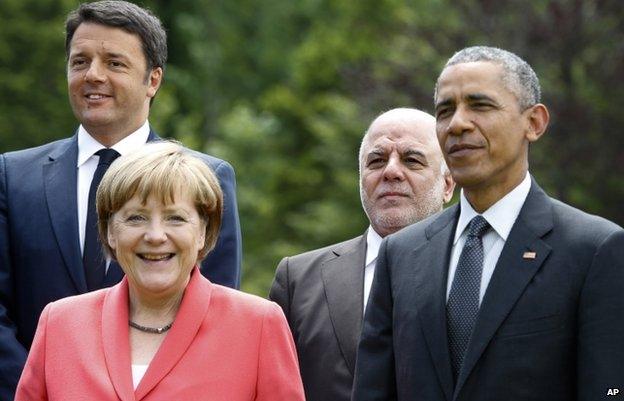
Mr Renzi signed up to a G7 statement warning of further measures against Russia if necessary
But if he's looking to the government in Rome to help him out, Mr Putin is unlikely to get satisfaction.
As a member of the G7, Italy was party to Monday's communique in Bavaria, external, which said sanctions would remain in place unless Russia met its commitments to February's Minsk agreement. It also warned of "further restrictive measures" if required.
To drive home the point, Italian Foreign Minister Paolo Gentiloni said his government wanted dialogue with Russia but was standing alongside its European and US allies.
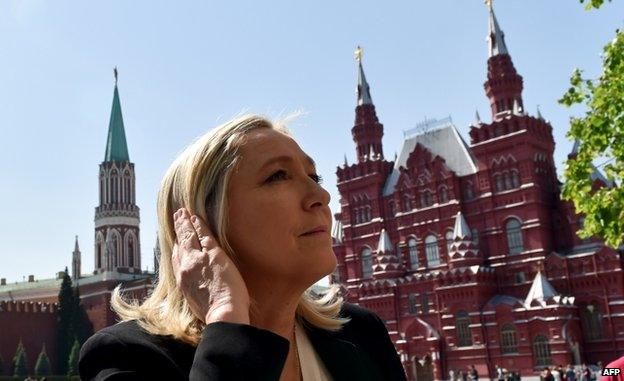
French National Front Leader Marine Le Pen visited Moscow in May
"I do not believe that Russia is really that interested in Italy breaking the front with its allies," he told Corriere della Sera, "because it knows that is not going to happen."
Doomed strategy
In truth, it's been apparent since the spring that European leaders were likely to renew sanctions, but this hasn't prevented Mr Putin from seeking out chinks in Europe's armour, whether by wooing cash-strapped Greece or developing ties with Europe's far-right parties, like France's National Front.
UK Foreign Secretary Philip Hammond warned of this last week.
"Of course we are concerned about what is clearly a Kremlin strategy of trying to pick off, shall we say, the brethren who may be less committed or more vulnerable in the run-up to the June decision," he told an audience at the London think-tank Chatham House.
But he said that, for now, the strategy was doomed.
"So long as they see a very clear message coming from Berlin on this issue, it would be a very, very high-risk strategy for any of them to decide to defy the will of the other 26, 27 members of the European Union."
A Western diplomat, speaking on condition of anonymity, put it more bluntly.
"If Greece or Cyprus says 'We're with Russia', they're finished. It won't happen."
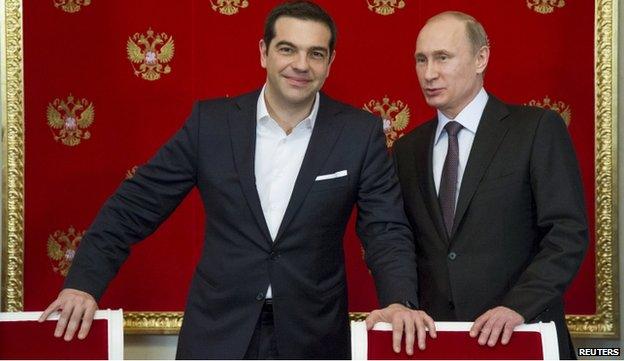
The Greek prime minister is due to return to Moscow later this month for talks on a gas deal
But he suggested the Kremlin knew this and was probably playing a longer game, counting on international weariness with an increasingly frustrating Ukraine crisis.
Kadri Liik, of the European Council on Foreign Relations, also believes Mr Putin is looking further ahead.
"He hopes the West will get tired of the situation," she says, "and then he'll try to impose his interpretation of the Minsk agreement."
And that means currying favour where he can.
There's plenty of sympathy for Russia in Italy, as well as a widely held belief that the EU has mishandled the crisis in Ukraine.
Oil and gas
In Hungary, it's less the country, more the leader who Mr Putin thinks might be helpful.
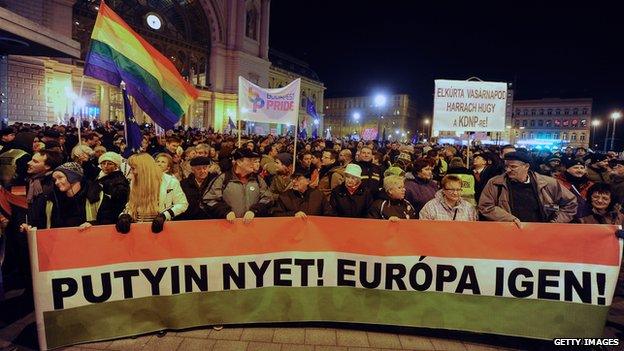
Protesters in Budapest were unimpressed with President Putin's trip to Hungary in February
Prime Minister Viktor Orban hosted the Russian president last February, during his only other European visit this year, apart from Belarus.
Mr Orban, like Czech President Milos Zeman, has been critical of EU sanctions.
For the controversial Hungarian leader, it's partly a case of competing economic priorities.
Germany is Hungary's top trading partner, but Russia is the country's main oil and gas supplier.
From Italy to Hungary, France to Greece, President Putin will continue to exercise what leverage he can.
And, says Ms Liik, it is not just about persuading the EU to see things his way. It is also about showing his own people that he matters.
"He needs to show that he's not isolated, that he's an actor in Europe."
- Published6 June 2015
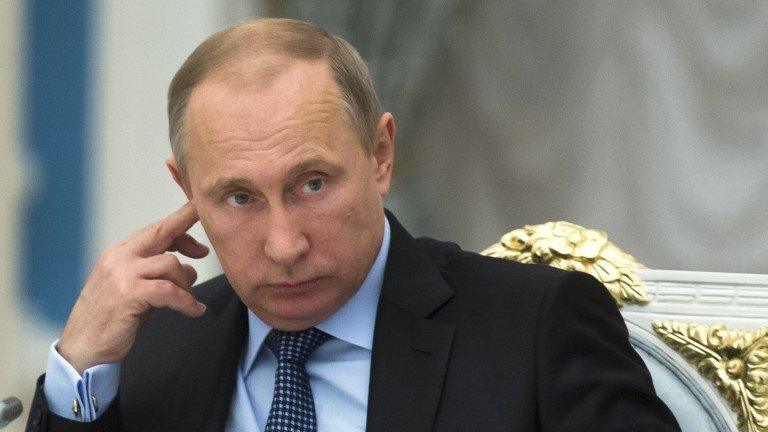
- Published7 June 2015
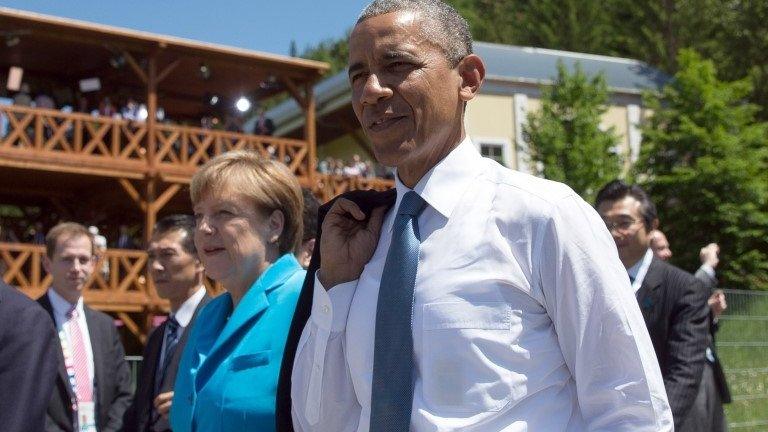
- Published9 April 2015
- Published9 June 2015
